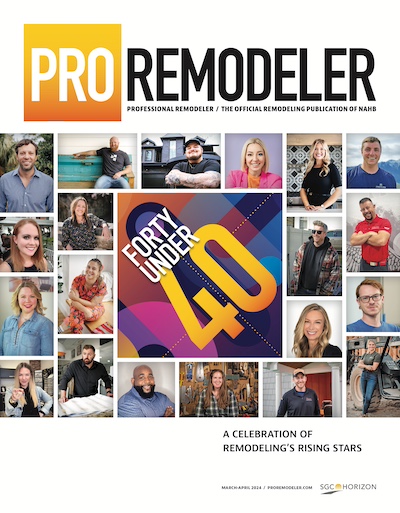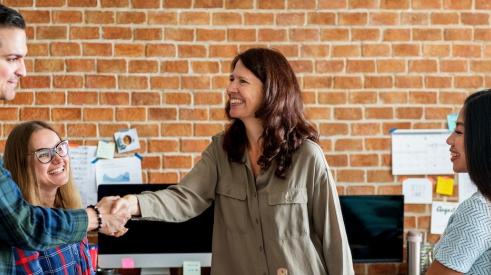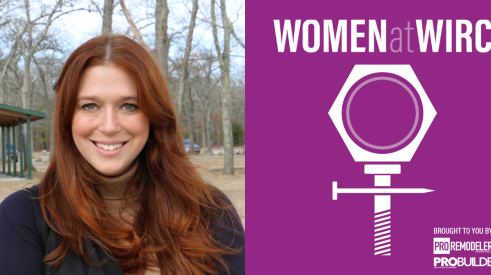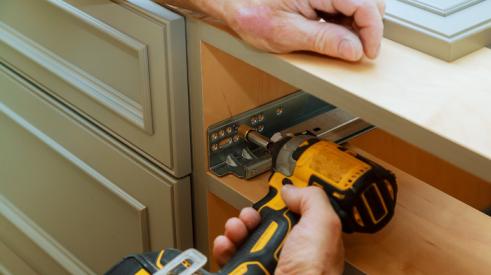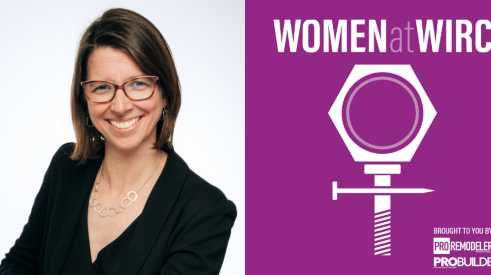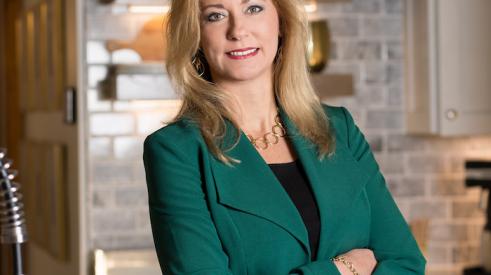|
When Sal Ferro, president of Plainview, N.Y.-based Alure Home Improvements Inc., sits down to interview a prospective salesperson, he has three things on his mind. Ferro, who still meets with every employee personally before they are hired, asks himself these same three questions about each and every candidate for a sales position.
 |
| Alure vice president Bob Hyman, president Sal Ferro and CEO Carl Hyman (left to right). |
"First, 'Would I buy from this person?'" says Ferro. "Second, 'Would my wife buy from this person?' And really what I'm saying is, 'Would a woman buy from this person?' And the third question I ask myself is, 'Would I mind if that person lived next door?' And I'll tell you, I've turned people away because I felt I wouldn't want them as my neighbor.
"They're simple, stupid, basic things, but it's really about reading people. In the end you have to have a gut instinct that says, 'This person fits what we're doing here.'"
It is this family-oriented approach to hiring that is the foundation upon which this $38 million, 83-employee residential remodeling firm has achieved nearly 300 percent growth since 2000 while increasing its net profit to almost 12 percent. It is also one of numerous reasons — including its marketing strategies, sales techniques and business systems — that Alure has been named Professional Remodeler's 2005 Remodeler of the Year.
Family-oriented business model
Creating a culture where people are top priority is at the core of Alure's enormous success.
"It was a good culture when I got here, but it just continued to evolve," says Ferro, now a part-owner who was hired by Carl Hyman in 1988 as an assistant production manager. "I've always focused on people. Even when I was young, it was all about people. I came from a large family and Carl happened to like what I was doing.
"But I felt that in order for this company to succeed, we had to maintain a culture where it was people first — employees first — where they felt that there was an environment where they could grow or they could operate."
Alure pays a bounty of $500 to any employee who refers a candidates who gets hired — $250 when they start and $250 after three months. In the last two years, at least 10 hires have been made as a result of an employee referral, says Ferro.
"That process ensures that you're recruiting people with character that will fit in to your culture," he says.
Alure's focus on creating a positive company culture is appreciated by its employees, whose survey responses have helped the company make Professional Remodeler's list of the Best Companies to Work For in the remodeling industry the past two years.
"The environment here is unbelievable," says director of marketing Seth Selesnow. "Ownership has done a great job bringing in the right people, team players only, and keeping those team players focused on the same goal, which is part of our vision statement: Provide Great Products, with No Hassles and Superior Results. Working at Alure is really like working with one big family."
 |
| The management team at Alure is the driving force behind the company's customer-focused approach. |
Capitalizing on emerging markets
Alure was founded as a paperhanging and painting business in 1946 by Sol Hyman, who hired his oldest son, Carl, in 1971 and his youngest son, Bob, in 1976. After existing primarily as an interior decorating retail store and service company until the late 1970s, Alure added exterior painting, siding, roofing and windows to the mix.
But it wasn't until 1991, when Carl decided to close the retail decorating store because of increased competition from Home Depot and others, that Alure turned its sole attention to remodeling, including the burgeoning middle market kitchen and bath business.
"Back then the kitchen and bath department was focused on helping people design, sell and install kitchens in the middle market, which basically didn't exist back then," Hyman recalls. "Back then, the kitchen and bath dealers only wanted to do high end [remodels]. The attitude was, 'If you're not going to spend a lot on the kitchen, get the hell outta here.' That was the attitude of the kitchen and bath dealers, so it was a very ripe market, the middle market. And the upper-middle market was also being underserved.
"We made no money on it at first, but we learned a lot. I was running the business and Sal was the technical hands-on guy — and an organized son of a gun."
In 1997, Owens Corning introduced its basement finishing system and approached Hyman about test marketing it. Hyman saw the prefinished, insulated wall system as another opportunity for expansion, and he agreed to make Alure the country's first franchise for the system. Alure estimates its Owens Corning basement franchise will do more than 400 jobs and $16 million in sales in 2005. The company has been named the Owens Corning Franchise of the Year four years in a row (2001–2004).
In 2004, Alure began installing Temo Sunrooms, and in 2005 it added the Owens Corning aboveground room finishing system. Alure currently operates as three departments: Alure Designs (kitchens and baths), Alure Home Improvements (siding, roofing, windows and sunrooms) and Alure Basements (basements, attics and garages).
"The foundation of our growth was seeing markets and knowing when to get in and get out," says Ferro. "We got into basements, and we started to hit on all cylinders. We had this team that had gelled and we were thinking, 'Now we can get more out of this team exponentially,' as opposed to getting this much from the team you can get this much more because things are starting to click."
Each department has its own dedicated sales force, production department and service team, which allows each to operate with the efficiency of a specialty contractor, but with the wealth of resources of a large company.
"As we've grown, I've always used the word department and not division, which sounds like we're divided," says Hyman. "In the case of basements, if I had just added that as an additional product that everybody could sell, it never would have taken off. It's under the same corporate umbrella, the same culture, the same structure, but we set up a dedicated sales team, production team, installers and so on. Without that, it wouldn't have worked. We put people in place and invested in each of the businesses early on. We put somebody in charge of each them rather than saying, 'Just add it to the mix.' That's absolutely vital."
"What I'm most proud of personally is that I was able to recognize markets and know when to get in them and when to get out. We made a lot of money doing pressure washing and steam carpet cleaning and spray painting homes and selling paint and wallpaper, but we have transitioned this company in the last 10, 12, 15 years into what it is today."
Leveraging the existing customer base
Another key to Alure's growth mechanism has been the way in which they launched each new business from the customers of the existing businesses. Alure concentrates its marketing on past customers for referrals and repeat business, which generates better quality leads and higher closing rates.
"Most companies that are selling $42 million in volume, they need about 50 or 60 salespeople," says Ferro. "We have 36 salespeople. Our average salesperson sells about $1.2 million."
Two of Alure's core departments, Alure Designs and Alure Home Improvements, have a 68 percent repeat and referral rate, says Ferro. And although Alure Basements has just a 20 percent repeat and referral rate (mainly because it is concentrated in the newer territories of Westchester County and New Jersey), Ferro says that is still the highest in the Owens Corning franchise network.
"We're a classic example of how to leverage your existing customer base," says Ferro. "By leveraging the existing customer base, we could get into a new business rather quickly but also solidly. We were never these incredible marketers when it came to going out there and generating new business; we were incredible marketers in generating referral business and repeat business.
"It just allows you to be able to do so much more than somebody who's gotta start from scratch. But, you know what, everybody can't do it, because with that concept, you have to have something else to make it work. You've got to create raving fans. In order for you to leverage your existing customer base, if you haven't created raving fans out of your clients, you cannot count on them to refer you and repeat and continue to use you."
Perhaps the most important part of Alure's growth equation — in addition to capitalizing on hot markets and leveraging existing customers, — is providing quality customer service to the point where they exceed their clients' expectations on a regular basis. Alure provides a three-year warranty on all labor and materials, and each of its departments has a dedicated customer care staff in the office and in the field so callbacks are handled in an efficient and timely manner.
 |
| Alure's Owens Corning Basement Finishing System franchise is estimated to do more than $16 million in sales in 2005. |
The payoff comes in its referral and repeat customers. Alure surveys all its clients internally and has a 90 percent "thrill rate." The company also has received the Owens Corning Excellence in Customer Satisfaction Award every year it has been given (2003, 2004, 2005).
"We don't want to just satisfy people, we want to thrill them on a regular basis," says Ferro. "We want to create a raving fan. Our goal is to create a raving fan of every client that we have. We consider ourselves a company that is very sales and marketing driven, while staying customer service focused.
"We're getting into a high volume area where when you start to get to the numbers that we're getting to you worry about starting to lose some of the quality and some of the customer service for the sake of numbers. We don't want to do that. That's so important to us, and we haven't lost sight of the importance of customer service."
Sales and marketing strategies
 |
| Alure's design imaging specialist Paul Schmidt shows a couple some different design possibilities for their exterior on the plasma screen located in the showroom. |
The primer for Alure's referral and repeat business pump is the marketing machine now run by Hyman and Selesnow. Alure's entire client database receives a mailing at least every other month. The company's marketing pieces include semiannual newsletters, sales flyers, brochures and other direct mail pieces. Invitation-only networking parties for past clients are held quarterly at the Alure showroom and include entertainment, hors d'oeuvres and cocktails.
Alure's ability to close sales benefits from its use of 20/20 Design software to create a 3-D model of a client's kitchen renovation, allowing them to visualize design early in the process. Alure also uses digital imaging on a plasma screen in its showroom to show its exterior remodel clients what their finished project will look like and help them choose colors and styles.
Bolstering Alure's marketing strategy is its unique Partner Points Program, which allows customers to earn all-expenses paid tickets for two to the company's annual Caribbean trip in the spring. In order to qualify, clients must reach 200,000 points. One point is earned for every dollar a client spends on a project with Alure and for every dollar spent on the first project booked by a referred customer of theirs. To date, 27 clients have earned vacations via this referral generating program.
Although not intended as part of its marketing plan, Alure's charitable work and community service is noteworthy for the attention it has garnered the company. These efforts include donations to breast cancer research, homeless and hunger centers and the Boy Scouts of America, among others. In December, Hyman will be honored by the Boy Scouts as its Distinguished Citizen of the Year.
The three projects Alure has completed for the ABC hit television show "Extreme Makeover: Home Edition" has gained the company great regional attention. Producers of the show first approached Alure in 2004 about doing a live 12-hour renovation of the apartment of two New York City firefighters. Ferro and Hyman were at first hesitant, but decided to give it a try. Three projects later, Ferro is convinced it was the right thing to do, for more than just the marketing gain.
"We knew it was going to cost us some money," says Ferro. "And to be honest, the experience was mediocre. It wasn't incredibly fulfilling. But our team bonded like I'd never seen before, because it was one of the most challenging and emotional episodes I've ever gone through trying to get it done. It was an unreasonable amount of time to try and get it done, and it actually took us 24 hours to get it done."
When the producers asked Alure to participate in a second segment, Ferro was hesitant.
"At first, I said not really," Ferro recalls. "It wasn't nearly as fulfilling as some of the other charity work that we do. But the second time around we helped a family, Lucy Ali and her kids Paul and Kuran, and we changed their lives. I get chills when I think about it. It was an incredible experience for me personally, and emotionally I can't tell you what it was like to be a part of changing that family's life. It cost us a lot of money, but we got a lot of publicity out of it. It was a tremendous amount of publicity, but the money we spent on the show we could have spent to get that publicity. The valuable part was the bonding experience that our team gained from it. It was just an incredible experience for all of us."
Which gets right back to the main reason Alure has been so successful in the first place: its focus on people.
"Both Carl and I have been fortunate in life and we both have very generous mentalities to give back," says Ferro. "And you know what, it does come back to us."
To which Hyman chimes in, tongue firmly in cheek:
"And by the way, in his spare time he runs a home improvement company."
|
Alure's emphasis on hiring quality employees allows for controlled, sustainable growth
Add new comment
Related Stories
How to Create a World-Class Remodeling Team
Great remodeling companies position themselves for the future with the right players
Everyone Should Have a Number: KPIs for Your Design Build Team
Measuring key performance indicators guides your team to success while creating accountability and ownership
How to Revamp Your Pre-Construction Process
Experiencing too much slippage and delays? See how Bridget Bacon of Red House Design Build solved these issues by improving the remodeler's pre-construction process
How This Remodeler Revamped Their Pre-Construction Process
Bridget Bacon of Red House Design Build outlines how she helped transform the pre-construction process for improved finances and morale
Building A Small Projects Division from the Ground Up
Through hard work and careful strategy, Harth Home Services has seen big growth
A Mindset of Serving Others
A research study shows surprising results about what makes us take ownership of our work.
3 Keys to Successful Team Management
On this episode of Women at WIRC, hear Laura Burnes delve into her approach to leadership and project management, in addition to sharing insights into Adams + Beasley Associates' winning culture.
4 Steps to Prep Your Business for Contraction
How a remodeling company plans ahead for the worst of times (and the best of times)
Helping Remodelers 'Get Their House In Order'
From remodeler to NARI executive to industry consultant, Diane Welhouse uses her expertise to help business owners
